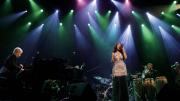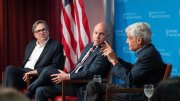The Harvard China Fund, established in 2006 to strengthen the University’s academic connections with the People’s Republic, has made its first faculty grants.
China’s higher-education system is “growing fast in size and even faster in quality,” according to Geisinger professor of history William C. Kirby, who directs the Fairbank Center for East Asian Research and oversees the new fund (for background, see “China Connections” at www.fas.harvard.edu/~asiactr/ china/other.html). By seeding research across the University, he said, the fund helps not only to maintain Harvard’s strength as a center for the study of China, but also to explore the best opportunities for deeper involvement with that nation’s very dynamic academic sector and to encourage novel, interdisciplinary programs involving scholars in both countries. By taking a venture-capital approach, he said, the fund can help initiate and identify the ideas with the highest potential to advance knowledge—in the arts and sciences and the professions—and to earn continuing support.
With support from the provost’s office, the fund last April put out a call for faculty proposals for interdisciplinary research and teaching that would address challenges facing China and improve collaboration with Chinese scholars and institutions. According to executive director John Chen, 28 proposals arrived from throughout Harvard and were reviewed by the fund’s advisory committee (with members from the Faculty of Arts and Sciences and the schools of design, law, government, medicine, and public health). The eight strongest were then vetted externally, resulting in these commitments:
• Disabilities. Stimson professor of law William P. Alford, director of East Asian legal studies, and colleagues, working with experts in China, will use $160,000 over three years to develop disability law, civic organizations, and various remedies for that nation’s disabled population (who may number as many as 130 million)—until recently, as the proposal puts it, a “much-neglected area” of law and services.
• Crisis management. Herman B. “Dutch” Leonard, who holds professorial appointments in the Kennedy School of Government (KSG) and Harvard Business School, and KSG colleagues will develop, with Tsinghua University, executive-education programs for emergency preparedness and response to crises, a $150,000 venture during its initial 18 months.
• Growth and air-pollution control. Butler professor of environmental studies Michael B. McElroy and Chris Nielsen, executive director of the Harvard China Project (www-as.harvard.edu/people/faculty/mbm/curr_research.html), both of the School of Engineering and Applied Sciences, will direct a two-year, $121,000 project in collaboration with Tsinghua to build scholarly capacity—from basic science to economic modeling and public-health studies—to assess China’s policies for controlling air pollution. (Nielsen coedited Clearing the Air: The Health and Economic Damages of Air Pollution in China, a collection of technical studies by scientists from both countries, just published by MIT Press.)
Finally, a smaller grant for joint medical training with Peking University, to address China’s emerging problems of kidney disease, diabetes, and hypertension, was awarded to a Harvard Medical School-Brigham and Women’s Hospital team.
In future funding rounds, Kirby said, proposals refined from this year’s applications, and new ones, will further broaden the number of Harvard schools represented and the range of issues pursued. In the long term, he said, the growth of such programs will help determine what kind of physical presence—ranging from a support staff to assist visiting researchers, to a conference facility with academic offices—Harvard might establish in China.





